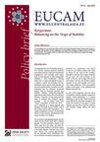Facing the Challenges of Separatism: The EU, Central Asia and the Uyghur Issue
Facing the Challenges of Separatism: The EU, Central Asia and the Uyghur Issue
Author(s): Sébastien Peyrouse
Subject(s): Political history, Recent History (1900 till today), Government/Political systems, Post-Communist Transformation, Sociology of Politics, Peace and Conflict Studies
Published by: CEPS Centre for European Policy Studies
Keywords: Separatism; European Union; Central Asia; Uyghur issue; regions seeking independence; post-Soviet states;
Summary/Abstract: During 2008, the move to grant Kosovo independence, the Russo-Georgian war and the revival of tensions in Xinjiang and Tibet moved the question of separatism once again to the top of the international agenda. In each of the three cases, the contradictory nature of issues to do with the inviolability of borders and a people’s right to self-determination, which marked European history in the first half of the 20th century and were brought to the surface with the break-up of the Communist federations (the Soviet Union, Czechoslovakia and Yugoslavia), were once again raised. The re-emergence of the principle of secession and the support offered to particular regions seeking independence from powerful states represents a considerable new challenge in the international system and one that could have a particular resonance in Eurasia. Although since independence, all post-Soviet states have shared an interest in clamping down on separatist claims, this situation has suddenly changed with the Russian Duma’s recognition of South Ossetia and Abkhazia as independent.
Series: EUCAM - Policy Brief
- Page Count: 6
- Publication Year: 2009
- Language: English
- Content File-PDF

